August: Our New Pangea Giving Program
IN THIS ISSUE
- Letter from our Executive Director
- Organization Profile: Pangea’s Core Values and Principles
- Organization Profile: “A High-Impact Relationship”: Robert Kalulu of CEP Uganda Speaks on his Experience with Pangea Giving
- Organization Profile: Pangea Giving Site Visits Build Trust
- Welcome New Members
- GlobalWA Member Events
- Career Center
- GlobalWA Events
Letter From Our Executive Director
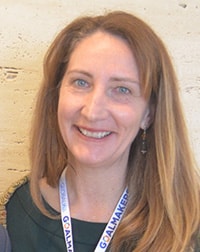
On August 1, 2023, after nearly a year of work, Global Washington finalized a merger with Pangea Giving, a Seattle-based giving circle that provides grants to community-based, grassroots organizations in Latin America, Southeast Asia, and East Africa. Pangea Giving is now a program of GlobalWA. Read our full Press Release here.
This is a very exciting moment for both organizations. As a program of GlobalWA, Pangea will be able to increase its member engagement, capacity, educational activities, partner relations, and programs in Seattle. For GlobalWA, having Pangea as part of its growing number of programs increases the ability for GlobalWA member organizations to co-create and partner with organizations based outside the U.S. for increased impact, and will create additional avenues of involvement for philanthropists. All with the ultimate vision to create a more equitable, healthy, and prosperous world.
Our Issue Campaign this month includes an interview with a Pangea Giving grantee, Executive Director Robert Kalulu of Child Empowerment Programme in Uganda; an interview with Pangea board members about the power and importance of site visits; and an article by one of the Pangea founders, Allan Paulson, about the founding and core principles that have guided Pangea since their formation in 2003.
More information about Pangea membership can be found here.
Also, a reminder that early bird rates for our 14th Annual Goalmakers Conference will be in effect until September 13th. We hope to see you there!

Kristen Dailey
Executive Director
Organization Profile
Pangea’s Core Values and Principles
By Allan Paulson, Founder of Pangea Giving
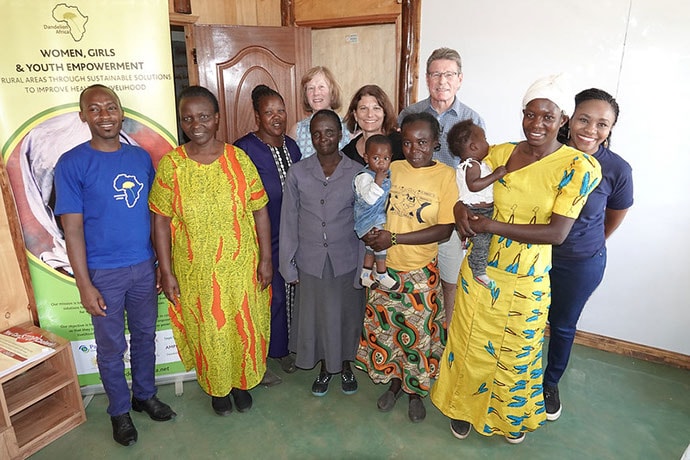
The Pangea team with four mothers with children in Dandelion’s programs. Photo: Pangea
Pangea Giving made its first grants in 2003 after a year of planning by a handful of people that grew to 13 members by the time we received and evaluated our first proposals. On this 20th anniversary, it is worth reflecting on the values and commitments that have brought us to this day as we become part of Global Washington.
The first thing that comes to mind is that we are a community. From the very beginning we met together in person, usually in someone’s home over a meal to make plans, learn about philanthropy and the needs of communities, evaluate proposals, learn about successes and challenges. We have always been a democratic community, making decisions through careful discussion, usually by consensus. And we decided early on that we wanted to be a learning community, taking a hands-on approach to understanding the needs of underdeveloped communities and learning from them how we can best be of help. This meant that we would conduct the entire process of making grants ourselves, from sourcing and evaluating proposals, to making site visits, to monitoring and evaluating the results and deciding how that informed our next steps. The site visits, where we could see for ourselves, became a wonderful part of the Pangea learning experience. Some of our partners told us that we were the first international donor to ever actually visit them. While not all of us could make site visits (which were at our own expense), we committed ourselves to communicating what we learned through robust educational meetings.
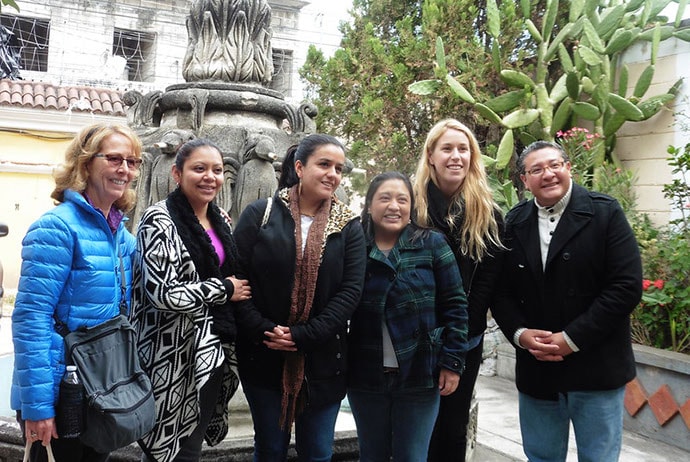
Pangea with ASOGEN team, Chimaltenango, Guatemala. Photo: Pangea
An essential part of our learning focused on figuring out what philanthropy meant to us and what our role and responsibility is to the people to whom we make grants. We were not engaging in acts of charity, which are often one off, emotion driven attempts to provide humanitarian relief by a superior giver. Charity often professes to address poverty, and we struggled with that characterization of people in the global South. Many of us knew from our own experiences that people in underdeveloped countries are rich in culture, community relationships and human wisdom, even as they suffer from the long term economic effects of colonial rule and exploitation.
Rather than charity, we embraced the idea that we wanted to make long term, strategic investments guided by the expressed needs of communities. We began to regard and call our grantees partners and commit ourselves to supporting their efforts for five to seven years. Rather than “helping” them, we would walk with them, sharing their successes and failures, and learning alongside them. Respect for our partners became a central value. For example, rather than receive applications which we would immediately evaluate and judge, we set up an iterative process that allowed us to ask questions for clarification and seek additional information with the partner before making funding decisions. And we set up a network of liaisons with our partners with the purpose of helping us understand them and helping them understand the values, motives and processes of Pangea. We also regularly sought feedback on our application, evaluation and report processes and made improvements in response.
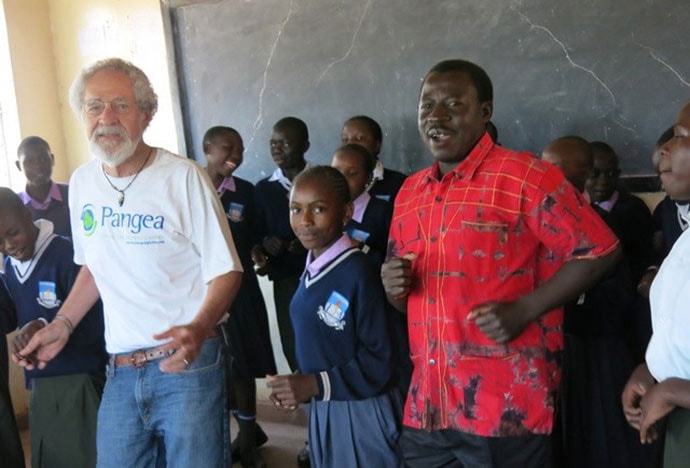
Allan Paulson visiting Pathfinder Academy in Kiminini Kenya. Kenyans always greet guests with a dance. Paulson is with Joshua Machinga, now an alumni partner, advisor to the Africa POD, and Pangea member. Photo: Pangea
Essential to walking along with our partners was developing a relationship of trust: trusting their definition of their needs and the strategies to address them, trusting their understanding of what works in their community and culture, trusting that they will be candid with us. Over the years several of our partners have told us about their screw ups, and organizational setbacks, including stealing by staff, bad purchases of equipment that failed, etc. They described with some amazement the internal debate they had about whether to be honest with the donor and break through the toxic power hierarchy that traditionally exists between donor and grantee.
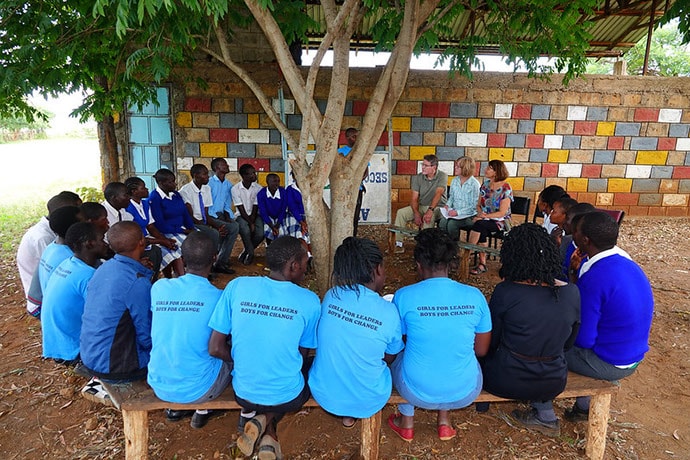
Meeting with YPP’s and Girls and Boys for Change at Athani Secondary School. Photo: Pangea
The approach we have chosen, which has come to be called “trust based philanthropy,” involves a higher degree of risk than many donors are used to. Yes we would all like to hit it out of the park, but sometimes the hose you bought for the water pump to irrigate the fields is too weak, sometimes someone runs off with some of the money we sent, sometimes birds destroy the sunflower crop that was going to be the source of marketable oil. Yes, those things happen, we learn as we go, and move on.
Over time, as we made frequent site visits, we saw opportunities to add value through our personal knowledge and contacts. Some of us facilitated workshops for strategic planning, team building and program development. Some of us mentored leaders and we sponsored a number of our leaders to attend development workshops in Seattle and elsewhere.
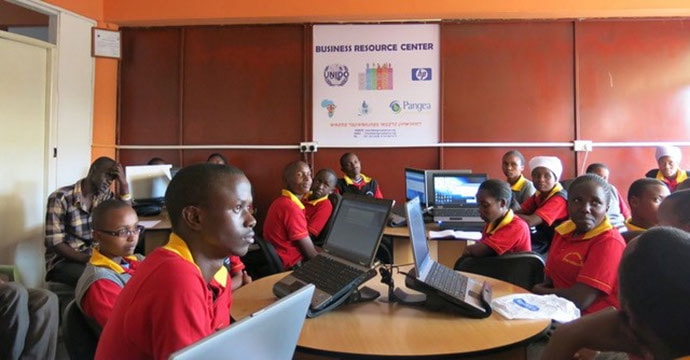
TEARS Group Kenya computer learning project. Photo: Pangea
As our membership grew and our interests diversified, we strove to remain an intimate community by forming PODs (think grant committees) to focus on Latin America, East Africa and Southeast Asia. Though we had certain criteria intended to provide a consistent approach, as we learned the intricacies of non-profit governance and community action in support of social justice in each region, we were flexible in permitting the PODs to set their own criteria. Sometimes we needed to work through other non-profits with established on the ground staff and processes. Sometimes we funded organizations that work across borders where we could not send funds. And although our original intent was to fund small early stage organizations who had not yet accessed international funding, we learned that in some places it was better to work with larger organizations that were nurturing small community organizations in their own country. As you learn what works, flexibility and innovation become key values.
In sum, community, democratic processes, respect, partnership, continuous learning, seeing for ourselves, flexibility and, above all, trust, are what has enabled Pangea to be such a satisfying and enduring experience for its many members and, we trust, of value to our partner communities.
Organization Profile
“A High-Impact Relationship”: Robert Kalulu of CEP Uganda Speaks on his Experience with Pangea Giving
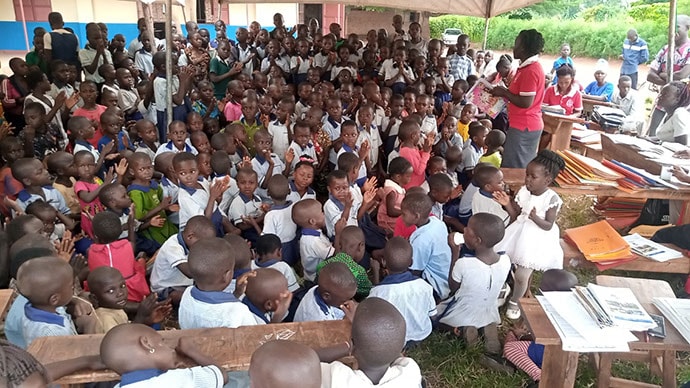
Pupils at an assembly at Orion Junior School. Photo: CEP
Pangea Giving, the newest program of Global Washington born from a merger of the two organizations completed on August 1, 2023, is a Seattle-based philanthropic initiative founded in 2003 with the goal of providing financial support and guidance to growing humanitarian organizations in the Global South. Pangea Giving’s unique model allows donating members to become directly involved in grantmaking decisions by joining regional committees, or Pods, which oversee operations in Guatemala, Mexico, Kenya, Uganda, Myanmar, Laos and Cambodia. For 2023, Pangea Giving announced grants totaling $114,000 to fifteen beneficiaries across Southeast Asia, Latin America, and East Africa.
One of these grantees, Child Empowerment Programme Uganda, is slated to receive $9500 in 2023 alongside guidance and support for their local operations. We spoke with CEP Uganda’s Executive Director, Robert Kalulu, on their experience as a beneficiary of Pangea Giving.
Please introduce yourself and your organization. What is CEP Uganda’s mission, and what are some projects that best represent your organization’s work?
Thank you. My name is Robert Kalulu. I am the Executive Director for Child Empowerment Programme Uganda, a local community-based organization here in the Kamuli District in eastern Uganda.
Our mission is to empower disadvantaged children – especially girls – to reach their full potential, to live happily, respectably and productively. We do this by increasing access to quality education, economic empowerment for women, mentorship programs for adolescent girls and access to basic health services. We run Orion Junior School, where we support 162 children. This is funded by small community contributions from our beneficiaries whom we charge an equivalent of 2 hen ($12) per school term.
If we find that they can’t afford it, this is not a reason for their exemption from school. We also have a work program, where those that do not have anything to pay but can sacrifice hours of work can bring that to the school. We monetize their services as part of the community’s contributions. We also run the YANA Community High School on the same basis, where we support 367 girls and boys, including 20 girls per year who are involved in vocational training and economic empowerment.
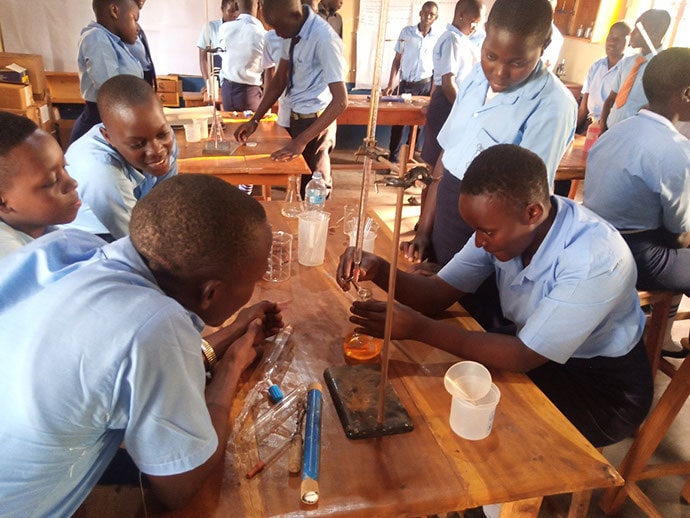
Practical chemistry lesson at Yana Community High School. Photo: CEP
We try to increase options for income generation, especially for widows and disadvantaged women who have children to support. We help them generate income and access credit. We encourage them to start and run sustainable businesses under our mentorship. We strive as much as possible to promote the significance girl child involving them in activities that raise their esteem, promoting income generation and involving them in celebrations like the International Day of the Girl Child, where they get involved in activities with their peers from other schools.
To promote health and access to basic services, we partner with the government and other entities and promote community health to raise awareness on emerging community health issues, we strive to help our beneficiaries access basic health services and sometimes for very complicated cases. For example, we had two children with congenital disorders that we helped to address.
What was Pangea Giving’s vetting process? How long did the process take, and what steps were taken by Pangea Giving to evaluate CEP Uganda as a potential beneficiary?
Pangea has a very interesting vetting process. It begins with a very thoughtful review and discussion. Leaders elected by Pangea will determine whether the organization needs to enroll other partners or not. Once it is clear that they need one, Pangea looks into recommendations from local and international organizations who are working in the region. Pangea will take up the recommendations and request profiles of prospective beneficiaries. These entail the history, mission and goals of these organizations, including a detailed look at the board and staff. The next step is a site visit, if possible and if they are convinced after the visit, that you are an organization that can benefit from their grant program, then they will give you an invitation for an application.
This invitation is not a guarantee that you will win the grant. Another part of their vetting process is a critical look at what you plan, whether it makes any sense or not. If you’re lucky and you win a grant, then you stand a chance of working with Pangea for 5-7 years.
The length of the vetting process varies, depending on how much time it takes for them to build a relationship with you and understand you.
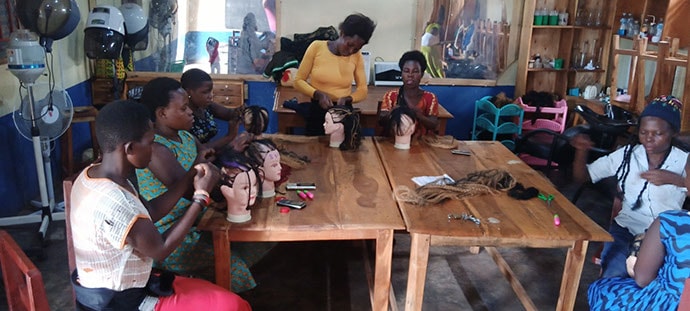
Students of the hairdressing class at Yana Community High School. Photo: CEP
Describe the experience of working with Pangea Giving. How would you evaluate the quality of their conduct as an enterprise, and the impression they have made on CEP Uganda?
I describe my relationship with Pangea as a high-impact relationship, with lots of respect for originality of ideas and shared learning. Pangea strives to learn from each of their grantees and shares the learnings amongst other partner organizations and creates opportunity for organizations to learn from each other through forums like the East African Leaders’ forum. Pangea respects the choices of the organizations they support and facilitates alignment of these choices to the specific needs of the communities served.
They fund ideas that will work and have a high impact for the communities targeted. And they are sometimes flexible when need arise; for example, during the pandemic, when it wasn’t easy for grantee partners to continue with our planned interventions and the world looked at everyone for a solution to the pandemic, Pangea gave organizations an opportunity to redirect the grants to intervene during that crisis. Pangea gave us flexible grants for general operations, which came at a time when many organizations were closing down due to depleting funds – Covid had affected them so much. Therefore, running day-to-day activities had become a problem.
We were lucky to be working with Pangea. Their flexibility had helped us stabilize and try new strategies.
What are the strategies, resources and tactics that Pangea Giving has provided CEP Uganda?
We have received financial support from Pangea. We’ve been able to fund our activities and projects, and met the needs of our communities. We have also been able to enjoy sessions of peer learning where all leaders of organizations funded by Pangea come together annually to share, learn from one another and network. These networks have helped small grassroots organizations to grow.
I did not join charity work as a professional, but out of the needs of the community. I dropped my teaching career to intervene for the community. Therefore, I needed to learn so many basic skills in running an organization, but it would be very expensive to hire persons with the required skills, or to enroll at university since we do not have a slot for that on our budget. But through networking like this, we share knowledge and foster learning, which has enriched our stock of knowledge as grantees of Pangea.
How has CEP Uganda benefited from these services and strategies? What progress has been made as a result of the partnership with Pangea Giving?
Pangea has helped to fund and revive our vocational school. In Uganda, we’ve adopted a new curriculum where much of the learning is practical. At this time, our vocational school will not only take care of the school girls who have dropped out of school, but the entire formal secondary school system; we are looking at expanding the vocational school to benefit the community as a whole. This revival was possible due to funding from Pangea.
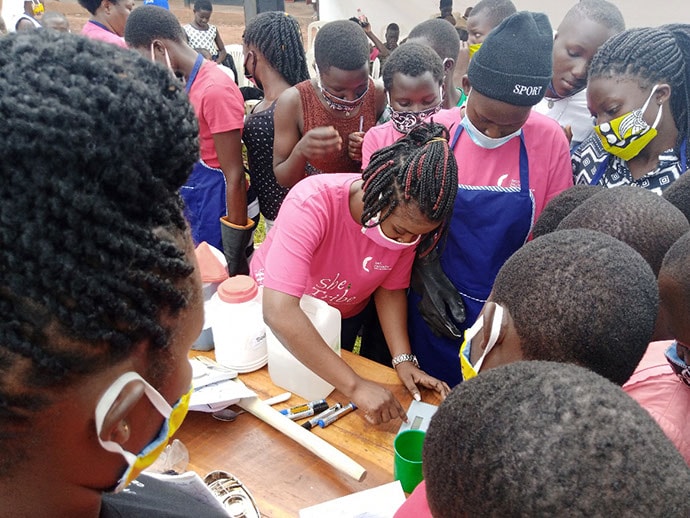
Liquid soap making class for adolescent girls. Photo: CEP
We had challenges accessing the internet where we would have to travel over 12 kilometers from home to use internet cafes in town. Thanks to Pangea’s funding, we now have internet access in the school itself. Teachers can research from within without having to go elsewhere, which has greatly reduced our expenses, improved teaching and the quality of teaching materials.
Pangea also funded the purchase of motorcycles which we used during Covid to access learners in the community. It was not very easy for many students to converge and conduct a usual large class because the standard then was to minimize social. So we organized classes in their local communities and the motorcycles helped us so much in transporting teachers to community-organized classes.
Pangea also helped in leadership development. I communicated earlier that organizations are able to meet and share knowledge – this is due to the East African Leaders’ Forum that Pangea funds every year. Recently we had one in Kenya, and it was so enriching. We generate answers to questions relating to challenges that our communities go through, compare notes, solve them internally, and grow through these forums.
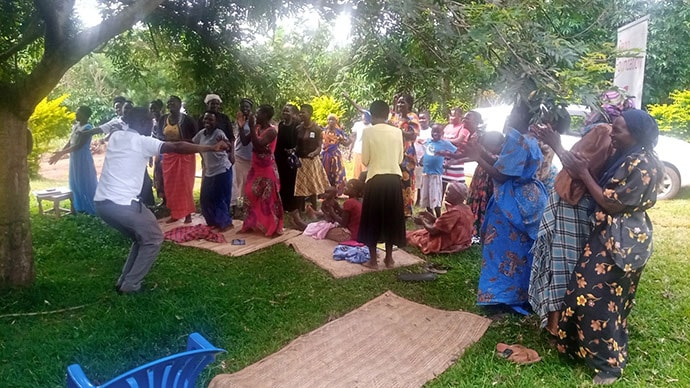
Atambula Empola women group in a financial literacy class. Photo: CEP
We also created new networks, which have been so beneficial for further shared learning and resource mobilization. We have received extra funding from other organizations through these networks. CEP Uganda adopted the idea of table banking from Dandelion and common ground for Africa. The idea fosters savings and peer learning and the two organization are part of our network of East African partners of Pangea.
Organization Profile
Pangea Giving Site Visits Build Trust
By Tyler LePard
Pangea’s founding story
A couple of months after the September 11, 2001, attacks, a group of people in Seattle started meeting to discuss how they could promote better understanding across cultures and countries. A giving circle is one of the ideas that came out of those meetings and some of the participants were drawn together to explore that option. This group of six like-minded people decided to work together to form a giving circle focused on rural community development in the Global South. They chose to create an all-volunteer-run organization rather than spending money on staff.
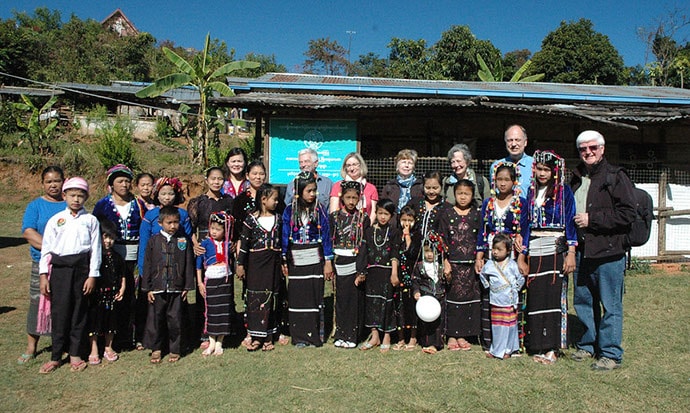
Meikswe ECCD Group, Myanmar, site visit. Photo: Pangea
“The next step was to engage others, so we decided to host an education session on the need for potable water in Central America. We chose this because having potable water is a high leverage issue that affects health, education, and the empowerment of women and girls, who often spend hours a day fetching water, and are vulnerable to assault as they hike though remote areas to find clean water. The Seattle Foundation kindly lent us a space, and we engaged the director of the Pacific Institute in Oakland, a leading think tank about water rights and resilience. At the end of that meeting, 13 people signed up to join the giving circle, and we were ready to begin to plan our first grant cycle,” said Allan Paulson, a founding member of Pangea Giving. (Read more about Pangea’s founding story.)
Pangea Giving was officially created in 2003. The name symbolizes the group’s desire to bring the world’s people closer together.
Site visits are important for partnership
One of the distinctive features of Pangea is their site visits to grant partners. They provide a real-time, real-lived experience where Pangea grows to better understand the social, political, cultural, economic, and environmental issues that their partners live out each day. It’s about building trust.
“I picked Pangea Giving because it’s about engaged philanthropy – more than just writing a check. I wanted to be engaged to learn about where I was giving money. I think that differentiates us some because part of our theory of change is building trusting relationships, and the other part is educating ourselves about the places in the world where we give money,” said Betsy Hale, Pangea Giving Advisory Council member.
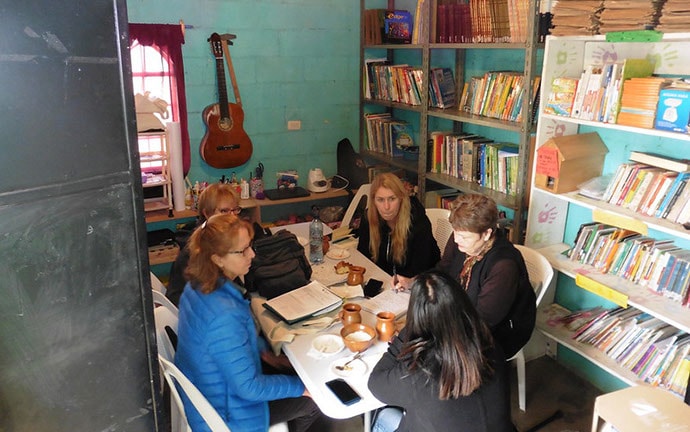
Pangea members meeting with Esperanza School, Guatemala. Photo: Pangea
Spending time with grantees builds personal connections and understanding that strengthens Pangea’s long-distance communication. While on site visits, members assess the leadership and staffing, review financial information, and confirm that grantees are following the grant guidelines and agreements.
“In Oaxaca State, we walked through a nearly-deserted rural village, then sat in the shade and talked with a few elderly farmers who remained working there. It was very difficult for them to continue farming because the water rights of these indigenous people had been taken away to support the voracious needs of the nearby, internationally-owned mine. I finally, palpably, understood why almost all the younger people from the village had immigrated to the United States to seek their livelihood because there wasn’t a viable future left in their village,” said Janet Pearson, Board President for Pangea Giving.
Part of the site visits include meeting with potential new grantees. Pangea mainly learns about potential partners through word of mouth. These may be referred to Pangea by current or previous grantees or organizations with values that align with Pangea.
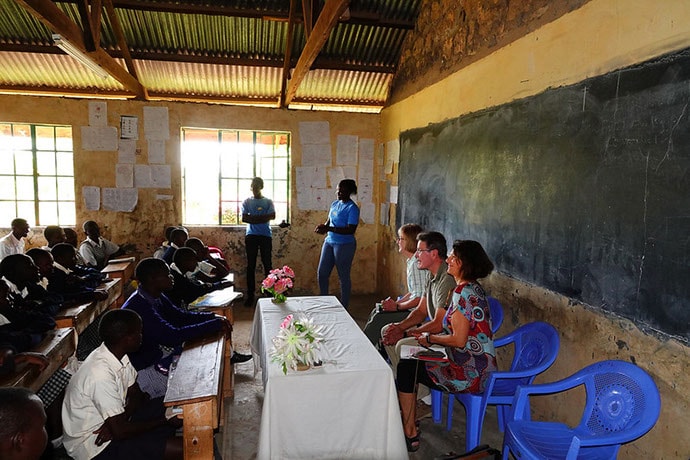
Visit to Saint Mary’s Primary School, Kenya. Photo: Pangea
“When I went to Laos recently, we traveled by minivan for three hours, then took a small boat upriver for half a day. There was no organized restaurants expecting us. We just fended for ourselves. I think that’s the way it should be. We’re going to visit small grantees where they are. If they’re in a small town, we’re in a small town. The participation, grantee selection, and site visits are what distinguish Pangea from other philanthropic activity that I’ve ever been involved in. Sending a check is just the beginning. Pangea members do everything. We meet people face-to-face, we’re not reading some polished report that they generated … It’s real,” said Paul Silver, Pangea Giving Advisory Council member. (Read more about Paul’s site visit in Laos.)
After the site visits, team members share their experiences and learning with other Pangea members through educational events, blogs, and at regional grant committee meetings. (Learn more about Pangea’s site visits.)
Virtual visits during COVID-19
COVID-19 has shown us how interconnected and interdependent we are in this world. Borders have little significance in the face of a global pandemic and climate change. During the COVID-19 pandemic, Pangea members learned to use Zoom to continue connecting with their grantees. Some grantees didn’t have the technical capacity to use it well, and some had concerns about the possibility of the government listening in, but overall using Zoom allowed Pangea to stay connected and communicate more frequently with their grantees. Of course, in-person visits enable more understanding and deeper trust, so Pangea resumed site visits when they could.
This year, Pangea gave $114,000 in grants to partners in East Africa, SE Asia, and Latin America.
Pangea joins Global Washington
Pangea Giving started with five founding members and grew to a membership of more than 50 individuals and families. Since 2003, it has partnered with 45 grassroots organizations in 13 developing countries and awarded more than $2 million in grants.
In 2023, Pangea Giving joined forces with Global Washington. Becoming a program of Global Washington will help Pangea with the administrative tasks that can be challenging for a volunteer-run organization. Pangea will also be able to increase its member engagement, capacity, educational activities, partner relations, and programs in Seattle.
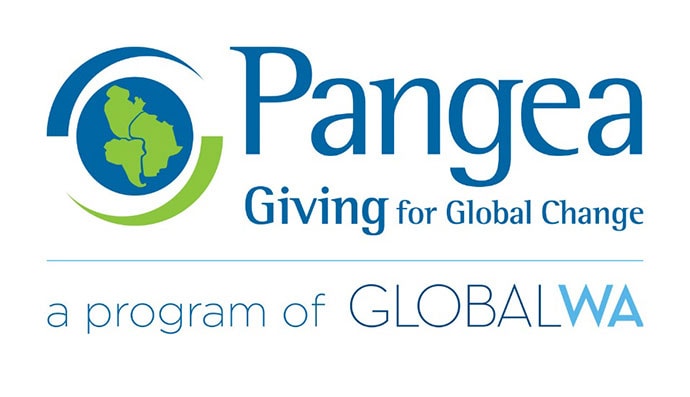
“It’s a win-win agreement,” said Janet Pearson, Board President of Pangea. “When we formed Pangea in 2003 with the vision to promote more direct and positive international engagement, we could not have imagined a better outcome now 20 years later. By joining forces with GlobalWA we will be able to fulfill our mission even better and reach more individuals who want to join Pangea. And, this is really exciting and necessary, especially with the many challenges grassroots organizations and communities in the Global South face today.” Pearson then adds, “It satisfies our need for expanding grant development, partner relations, and Pangea member support.”
Pangea is looking for people with values that align with theirs to join their giving circle. There are several pathways to membership: give the traditional annual membership fee (at least $1,500 for an individual, $2,500 for a family), contribute in-kind professional services such as translation/interpretation, or donate a different amount of money. Find out more about the giving circle program, or if you feel you are ready, join now.
East Africa Site Visit Team with Dandelion Africa, Kenya. Photo: Pangea
Welcome New Members
Please welcome our newest Global Washington members. Take a moment to familiarize yourself with their work and consider opportunities for support and collaboration!
Grow Further
Grow Further engages farmers, scientists, and investors in participatory innovation for global food security and sustainable agriculture. Growfurther.org
Providence Global Programs
Since 2012, the Providence Global and Domestic Engagement (GDE) department has partnered to make health impact through programs and service that honor the leadership, expertise, and goals of communities around the globe. We live our vision of health for a better world by responding root causes of disparities and working through local partnership to redress the health inequity created by historic colonialism. providence.org/about/community-partnerships/global-and-domestic-engagement
Member Events
September 23, 2023 Mona Foundation: MONA 2023 GALA
September 30 Lifting Those Left Behind Benefit Dinner | The Rose International Fund for Children
October 6, 2023 Agros International: Tierras de Vida 2023
October 25, 2023 A Night In Afghanistan | Benefit for Sahar Education
Career Center
Program Manager – Operations The Max Foundation
Communications Officer The Max Foundation
Vice President, Administration & Chief Financial Officer The Max Foundation
Office Manager / Administrative Specialist Linksbridge
Director of Finance and Operations Seattle International Foundation
Director, Business Development Splash International
Grant Writer Splash International
Cultural Orientation Volunteer International Rescue Committee (IRC)
Airport Pickup Volunteer International Rescue Committee (IRC)
Grants & Contracts Manager Snow Leopard Trust
Director, Monitoring, Evaluation, Research and Learning (MERL) HCP Cureblindness
Engagement Manager Linksbridge
Trainee Consultant Linksbridge
Check out the GlobalWA Job Board for the latest openings.
GlobalWA Events
September 7 Impact through Co-Creation: Transforming Global Funding Dynamics
September 20 Q3 Final Mile Logistics Working Group featuring The Max Foundation
September 28 GlobalWA Annual All Member Meeting
November 30 VIRTUAL: 2023 Goalmakers Conference
December 7 IN-PERSON: 2023 Goalmakers Conference